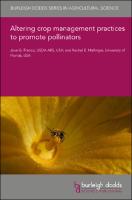Altering crop management practices to promote pollinators
Author(s)
Franco, Jose G.
Mallinger, Rachel E.
Language
EnglishAbstract
Agricultural intensification, or the increase in crop production per unit of input or land area to meet the needs of a growing population, has resulted in a landscape dominated by large scale monoculture cropping. Pollinators, specifically, are impacted by the lack of diverse floral and habitat resources associated with this type of farming. Agriculture must develop practices that diversify the crop landscape and increase the availability of habitat and flowering resources to support these populations. In this chapter, we summarize the available literature on how the production space, i.e., within a crop production field, orchard, or pasture, can be more effectively managed to sustain pollinator populations. We report on various spatial and temporal approaches within the context of various cropping systems (row crops, specialty crops, perennial orchards, and perennial forage and pasture systems). Collectively, these approaches represent opportunities to re-introduce diversity into the agricultural landscape to benefit pollinators.
Keywords
pollinators; land sharing; flowering crops; cover crops; crop diversityDOI
10.19103/AS.2022.0111.20ISBN
9781801465700, 9781801465700Publisher
Burleigh Dodds Science PublishingPublisher website
https://bdspublishing.com/Publication date and place
Cambridge, 2023Imprint
Burleigh Dodds Science PublishingSeries
Burleigh Dodds Series in Agricultural Science,Classification
Apiculture (beekeeping)
Sustainable agriculture
Agricultural science
Agronomy and crop production


 Download
Download